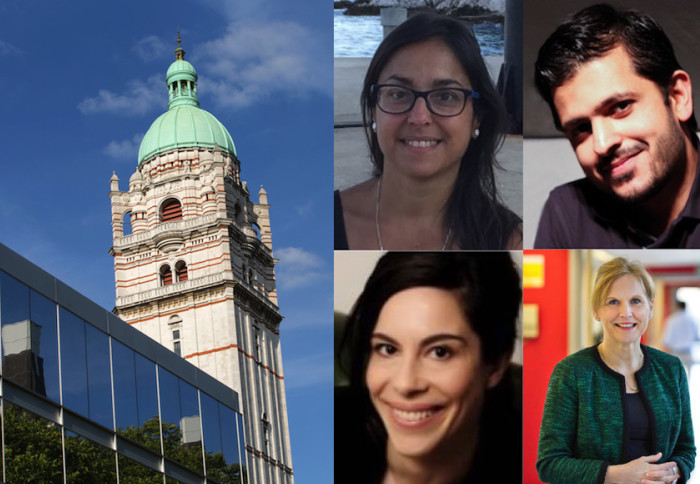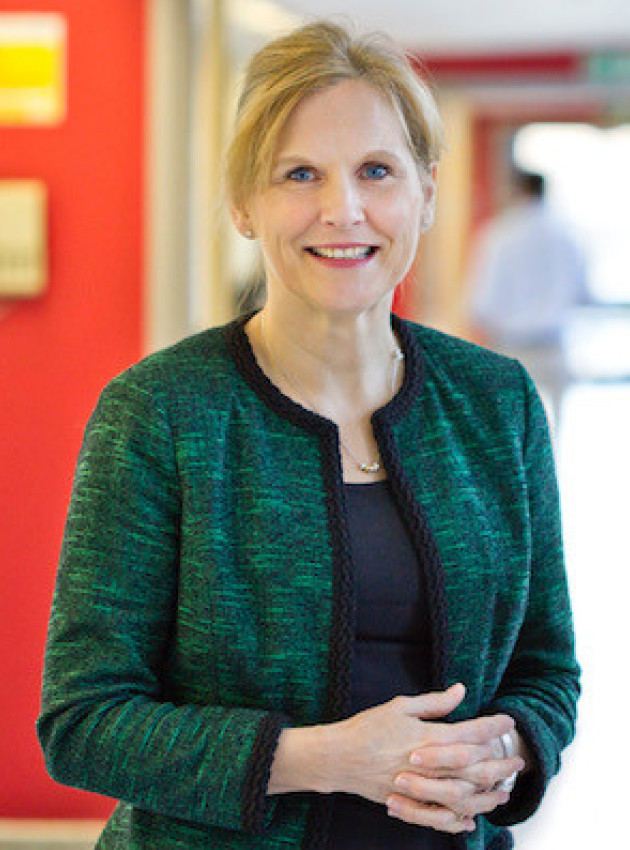Women in MDR celebrated in the latest round of academic promotions

The Department of Metabolism, Digestion and Reproduction is proud to announce four academic promotions, three of which are women.
Well done to Professor Maud Lemoine, a Professor and Honorary Consultant in Hepatology; Professor Siwan Thomas-Gibson, a Professor of Practice in gastrointestinal endoscopy; Dr Alejandra Tomas Catala, a Non-Clinical Senior Lecturer; and Professor Amir Sam, a Professor of Education and Consultant Endocrinologist.
Speaking about the promotions, Head of Department of Metabolism, Digestion and Reproduction, Professor Mark Thursz said: "Congratulations to all my promoted colleagues, their research and hard work deserves this recognition. I am also extremely proud of the growing number of senior female academics in the Department."
Below we speak to MDR's four newly promoted academics.
Professor Maud Lemoine
 In August 2019, I was made Head of the Section of Hepatology and Gastroenterology and my research activities are mainly focused on the prevention and management of viral hepatitis and its liver complications in resource-limited countries. I am currently leading the PROLIFICA research group, which aims to develop simplified strategies to improve screening, diagnosis and management of patients with chronic liver disease living in Africa.
In August 2019, I was made Head of the Section of Hepatology and Gastroenterology and my research activities are mainly focused on the prevention and management of viral hepatitis and its liver complications in resource-limited countries. I am currently leading the PROLIFICA research group, which aims to develop simplified strategies to improve screening, diagnosis and management of patients with chronic liver disease living in Africa.
I really enjoy my current research activities because they combine multiple fields of research (epidemiology, clinical research, virology, basic & applied research, anthropology and health economy). As a result, I collaborate with many different people and I can develop new skills. Moreover, my research activities impact on individual and global health levels and are translated at both national and international levels, which is very exciting.
As a female medical doctor and researcher trained outside the UK, I feel extremely grateful and privileged to work in an environment where diversity, gender equity and female inclusion are recognised as a key component of success. I hope that my promotion can help female colleagues - from inside outside the UK - gain confidence in their own career development, despite the number of social and individual obstacles that many women have to face.
I am very happy to hear that 75% of the promotions in the department were for women. It is a positive signal of progress in reducing the gender gap observed in leadership roles at many European universities. Despite the increasing number of women at medical schools, the proportion of them who will become a full Professor remains low (estimated below 25% a couple of years ago). Too many female academics give up their career's for reasons like the "mental workload" often related to balancing family duties and lack of opportunity, support and confidence with unconscious “impostor syndrome”. By offering promotion opportunities to female researchers, our department shows that it is possible to overcome the individual and collective barriers for greater female representation in academia.
Professor Siwan Thomas-Gibson
 I am based at The Wolfson Unit for Endoscopy at St.Mark's and Northwick Park Hospitals Campus and my current research interests include:
I am based at The Wolfson Unit for Endoscopy at St.Mark's and Northwick Park Hospitals Campus and my current research interests include:
- Postgraduate training in endoscopy and specifically high-quality colonoscopy
- Improving Patient Safety in Endoscopy
- Training in Non-technical Skills and Human factors
Efficiency in endoscopy has never been more important. Colonoscopy has the capacity not only to detect but also to prevent bowel cancer and we have an obligation to ensure this is available to as much of the population as possible and that it is provided in a very high quality and safe manner. Efficient training of more endoscopists is crucial at a time when there are constraints on training and increasing demand on our NHS services. Incorporation of novel technology such as Artificial Intelligence will be welcomed but must be introduced with a strong evidence base. All of this can be achieved if we have endoscopists and their teams functioning together in a highly skilled and motivated way.
As a graduate of Imperial Medical school (1992) I am incredibly honoured and excited to have been awarded this promotion. It is not only a deeply rewarding personal achievement but also represents the collaborative work I have done with so many of my colleagues over the years. I am a very proud member of the St.Mary's/Imperial medical faculty and of course, hope to continue to 'give back' to the college and our students both close to home and further afield.
Women are under-represented in academia and at the professorial level. This is for a multitude of factors and partly because so many of us suffer from imposter syndrome. With 50% or more of our medical students now being female, I hope that increased representation at a senior level will inspire all of our students, not just the women, as undoubtedly we bring something different to the table, complementing our male colleagues. I am delighted to play a small part in this development within MDR and Imperial's Faculty of Medicine.
Dr Alejandra Tomas Catala
 I am based in Section of Cell Biology and Functional Genomics, where I am primarily interested in the role of endocytic trafficking on the modulation of receptor signalling and complex signal integration. My aims are to establish relevant effects on cellular function in health and disease, and to inform the development of new therapeutic approaches. My current research is based on the study of the regulation of glucose homeostasis, with a particular interest in the mechanisms of incretin action in pancreatic beta cells and other metabolically relevant organs.
I am based in Section of Cell Biology and Functional Genomics, where I am primarily interested in the role of endocytic trafficking on the modulation of receptor signalling and complex signal integration. My aims are to establish relevant effects on cellular function in health and disease, and to inform the development of new therapeutic approaches. My current research is based on the study of the regulation of glucose homeostasis, with a particular interest in the mechanisms of incretin action in pancreatic beta cells and other metabolically relevant organs.
Over the last few years, it has become increasingly clear that receptor trafficking has a key role in controlling signalling patterns at different rates and subcellular locations. Targeting of endogenous factors controlling these pathways could therefore be potentially envisaged as an unexplored therapeutic avenue. Furthermore, different ligand modifications allow fine-tuning of these trafficking and signalling processes. This concept is appealing for clinical practice, as it can translate into more potent agonists with prolonged action in lower doses and fewer side-effects. Last but not least, as double and triple agonists of the incretin hormone receptors are underway, trafficking profiles and signalling bias could be exploited to elicit optimal responses in this setting of the increased complexity of downstream pathways.
I see my promotion as a recognition of my group previous work in our chosen subject as well as an opportunity to continue to grow and expand on our research in the near future. It is also a welcoming development to see that 75% of this year's promotions went to women. I hope it will contribute to extending the culture of inclusivity and balanced representation and hopefully improve the work environment for everyone at the Department.
Professor Amir Sam
 I am honoured to have become a Professor at Imperial College London. I started at Imperial almost 15 years ago as an Academic Clinical Fellow and have since benefitted enormously from the wisdom and generosity of my mentors and colleagues.
I am honoured to have become a Professor at Imperial College London. I started at Imperial almost 15 years ago as an Academic Clinical Fellow and have since benefitted enormously from the wisdom and generosity of my mentors and colleagues.
Imperial College is rightfully amongst the top ten universities in the world, not only because of its scientific and educational rigour but also because of the supportive environment it creates for academics and clinician scientists like me. Imperial enabled me to pursue my education and research aspirations in both Endocrinology and Medical Education.
The year 2020 will be an unforgettable year for all of us with the profound changes we have seen in our lives, but it has been made even more memorable for me with my appointments as Head of the School of Medicine and a Professor at Imperial College London.
Article text (excluding photos or graphics) © Imperial College London.
Photos and graphics subject to third party copyright used with permission or © Imperial College London.
Reporter
Benjie Coleman
Department of Surgery & Cancer